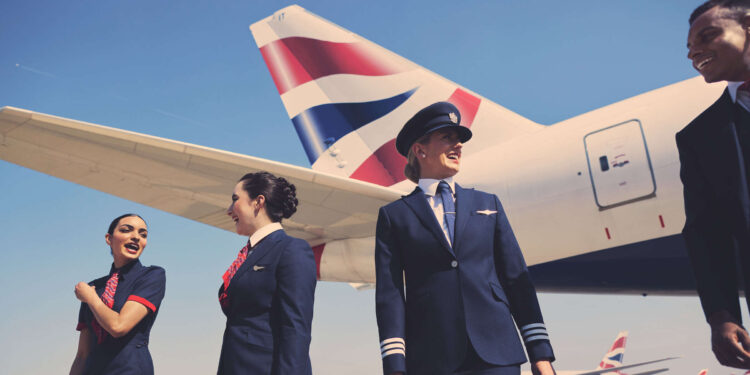British Airways: A Comprehensive Overview

Cabin crew airside on tarmac next to British Airways aircraft
British Airways (BA), the flag carrier airline of the United Kingdom, stands as one of the most recognized and respected names in the aviation industry. With a rich history that dates back to the early 20th century, BA has evolved into a global airline, renowned for its commitment to quality service, innovation, and connectivity. This article delves into the history, development, operations, challenges, and future prospects of British Airways, painting a comprehensive picture of this aviation giant.
History and Development
The origins of British Airways can be traced back to 1919, with the formation of Aircraft Transport and Travel Limited (AT&T), which operated the world’s first scheduled international flight from London to Paris. The early years saw numerous mergers and acquisitions, leading to the creation of Imperial Airways in 1924, which later merged with British Overseas Airways Corporation (BOAC) and British European Airways (BEA) to form the modern British Airways in 1974.
The airline was privatized in 1987 under the leadership of Sir John King, marking a significant turning point. This move was part of the UK government’s broader strategy to reduce state ownership in various industries. The privatization allowed British Airways to operate with greater flexibility and compete more effectively on the global stage.
Fleet and Operations
British Airways boasts a diverse and modern fleet, designed to cater to a wide range of routes and passenger needs. As of 2024, the fleet includes various models from Boeing and Airbus, such as the Boeing 777, Boeing 787 Dreamliner, and Airbus A380, among others. These aircraft are equipped with state-of-the-art technology, ensuring safety, efficiency, and comfort.
The airline’s operations span six continents, with significant hubs at London Heathrow and London Gatwick airports. BA’s extensive network covers over 200 destinations in more than 80 countries, making it a crucial player in global air travel. The airline’s strategic alliances, including its membership in the Oneworld alliance, further enhance its connectivity and service offerings.
Customer Service and Experience
British Airways has long been synonymous with high-quality customer service. The airline offers a range of travel classes, including Economy, Premium Economy, Business, and First Class, each designed to cater to different passenger needs and preferences.
- Economy Class: Known for its affordability and value, Economy Class provides comfortable seating, complimentary meals, and in-flight entertainment. The World Traveller service offers additional amenities for long-haul flights.
- Premium Economy: The World Traveller Plus service offers a more spacious seating arrangement, enhanced meal options, and increased baggage allowance. This class is designed for passengers seeking extra comfort without the premium price of Business or First Class.
- Business Class: The Club World service features fully flat beds, access to exclusive lounges, priority boarding, and premium dining options. The Club Europe service caters to short-haul Business Class passengers with similar benefits on a smaller scale.
- First Class: The epitome of luxury, First Class on British Airways includes private suites, gourmet dining, exclusive lounges, and personalized service. This class is designed for passengers seeking the highest level of comfort and exclusivity.
Innovation and Sustainability
British Airways has consistently been at the forefront of innovation in the aviation industry. The airline was one of the pioneers of the Concorde, the world’s first supersonic passenger jet, which operated from 1976 until 2003. Although the Concorde is no longer in service, BA continues to invest in cutting-edge technology and innovation.
Sustainability is a key focus for British Airways as the airline industry faces increasing pressure to reduce its environmental impact. BA has implemented several initiatives to address this challenge:
- Fleet Modernization: The introduction of newer, more fuel-efficient aircraft, such as the Boeing 787 and Airbus A350, has significantly reduced the airline’s carbon footprint.
- Sustainable Aviation Fuel (SAF): BA has been actively involved in the development and use of SAF, which can reduce carbon emissions by up to 80% compared to traditional jet fuel. The airline aims to power 10% of its flights with SAF by 2030.
- Carbon Offsetting: BA offers passengers the option to offset the carbon emissions from their flights through investments in renewable energy projects and reforestation programs.
- Waste Reduction: The airline has committed to reducing single-use plastics and improving recycling processes both on board and in its operations.
Challenges and Adaptations
Like all major airlines, British Airways has faced numerous challenges over the years. The COVID-19 pandemic had a particularly profound impact on the aviation industry, leading to unprecedented disruptions in global travel. BA was forced to ground a significant portion of its fleet, implement cost-cutting measures, and adapt to changing travel regulations.
The airline responded to the crisis with several strategic initiatives:
- Flexible Booking Policies: To accommodate the uncertainty faced by travelers, BA introduced more flexible booking options, allowing passengers to change or cancel their flights without penalty.
- Health and Safety Measures: Enhanced cleaning protocols, mandatory face masks, and social distancing measures were implemented to ensure the safety of passengers and crew.
- Digital Transformation: The pandemic accelerated the airline’s digital initiatives, including the development of contactless check-in, digital health passports, and improved mobile apps.
Financial Performance
British Airways, as part of International Airlines Group (IAG), has experienced fluctuations in its financial performance due to various factors, including economic conditions, fuel prices, and geopolitical events. The airline’s ability to adapt to changing market dynamics has been crucial in maintaining its competitiveness.
Despite the challenges posed by the pandemic, BA has shown resilience. Cost-saving measures, government support, and strategic investments have helped the airline navigate through the crisis. As global travel recovers, BA is well-positioned to capitalize on the resurgence in demand.
Corporate Social Responsibility (CSR)
British Airways is committed to its corporate social responsibility (CSR) initiatives, focusing on areas such as community engagement, diversity and inclusion, and environmental sustainability.
- Community Engagement: BA supports various charitable organizations and community programs, both in the UK and internationally. The airline’s Flying Start partnership with Comic Relief has raised millions of pounds to support vulnerable children and young people.
- Diversity and Inclusion: BA promotes a diverse and inclusive workplace, recognizing the importance of reflecting the global communities it serves. The airline has implemented policies to support gender equality, LGBTQ+ rights, and cultural diversity.
- Environmental Sustainability: In addition to its efforts to reduce carbon emissions, BA is committed to minimizing its overall environmental impact. This includes initiatives to reduce waste, conserve water, and protect biodiversity.
Future Prospects
The future of British Airways looks promising as the airline continues to innovate and adapt to changing market conditions. Several key factors will shape its trajectory in the coming years:
- Technological Advancements: The adoption of new technologies, such as artificial intelligence, biometrics, and blockchain, will enhance operational efficiency and customer experience.
- Sustainability Initiatives: BA’s commitment to sustainability will play a crucial role in its long-term success. The airline’s investments in SAF, electric and hybrid aircraft, and other green technologies will help it meet environmental targets and regulatory requirements.
- Expansion and Partnerships: Strategic alliances and partnerships, both within the Oneworld alliance and with other airlines and travel companies, will expand BA’s global reach and service offerings.
- Customer Experience: Enhancing the passenger experience through personalized services, improved in-flight entertainment, and seamless travel solutions will remain a priority for British Airways.
Conclusion
British Airways has a storied history and a bright future. From its humble beginnings in the early 20th century to its current status as a global aviation leader, BA has demonstrated resilience, innovation, and a commitment to excellence. As the airline navigates the challenges and opportunities of the 21st century, it will continue to play a vital role in connecting people and cultures around the world. With a focus on sustainability, customer service, and technological advancements, British Airways is well-equipped to soar to new heights in the years to come.





